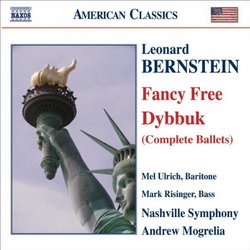A Needed New Recording of Bernstein's 'Dybbuk', Plus a Livel
J Scott Morrison | Middlebury VT, USA | 12/12/2006
(5 out of 5 stars)
"Leonard Bernstein and choreographer Jerome Robbins began talking about a ballet based on S. Ansky's play, 'The Dybbuk', as early as 1947 -- three years after they had collaborated on the other work on this disc, the 'Fancy Free' ballet -- but they never got around to it until the early 1970s. They intended it to be presented on the 25th anniversary of the founding of Israel but didn't quite make it; it had its premiere at the New York City Ballet in 1974. This was their fourth collaboration (Fancy Free; On the Town; West Side Story; Dybbuk). The ballet tells the story of two youngsters who were pledged to each other at birth by their fathers. But the father of the girl later arranges the betrothal of his now-grown daughter, Leah, to a rich man. The rejected son, Channon, dabbles in the black arts and becomes a dybbuk, in Jewish folk belief a 'wandering soul which enters into a living person and talks through his mouth, presenting a separate and alien personality.' In this case the dybbuk inhabits the body of Leah at her wedding causing her to speak in his voice, which brings the ceremony to a hasty and confused end. A rabbinic court is convened and the dybbuk exorcised, but now Leah is convinced she must be with Channon and she renounces her life so she can be with him in eternity.
Bernstein's music for 'Dybbuk' is unusual for him in that he uses twelve-tone technique extensively, in this case to depict the forces of evil; in contrast, tonal (although harmonically advanced) music is used for the forces of good. This is, of course, an allegorical comment on the conflict going on in classical music circles in the 1970s regarding using tonal versus non-tonal approaches. This ballet leaves little doubt where Bernstein's affinities lay.
The forty-five minute ballet is powerful in its effect, and it is given a powerful performance by the marvelous Nashville Symphony, last heard in their recent significant recording of Villa-Lobos's complete 'Bachianas Brasileiras'. The latter was conducted by the symphony's music director, Kenneth Schermerhorn, who died while the project was still unfinished. Andrew Mogrelia was called in to complete the Bachianas recording and is the conductor here in the Bernstein. His background includes a great deal of experience leading ballet performances and one can hear that in this recording. Bernstein recorded the work in 1974 but the sonics are dated; this recording provides a modern-sound version that fills a real need.
'Fancy Free' is surely one of Bernstein's best-known scores, beloved since its premiere in 1944 when it became his first big hit. In its almost thirty minute length it depicts the actions of three sailors on wartime shore leave in New York City. The music is jazzy, ebullient and sexy. It is given a rhythmically alert and exciting performance here by Mogrelia and the Nashville orchestra.
Incidental soloists in these two works are Mel Ulrich, baritone, and Mark Risinger, bass, who chant the occasional Hebrew passages in 'Dybbuk' and Abby Burke, who sings 'Big Stuff' (originally sung by Billie Holiday) in 'Fancy Free' accompanied by Stephen Kummer, piano, Roger Spencer, double bass, and Samuel D. Brown, drums. Kummer also has an important obbligato role in the ballet proper.
Enthusiastically recommended.
Scott Morrison"


 Track Listings (29) - Disc #1
Track Listings (29) - Disc #1